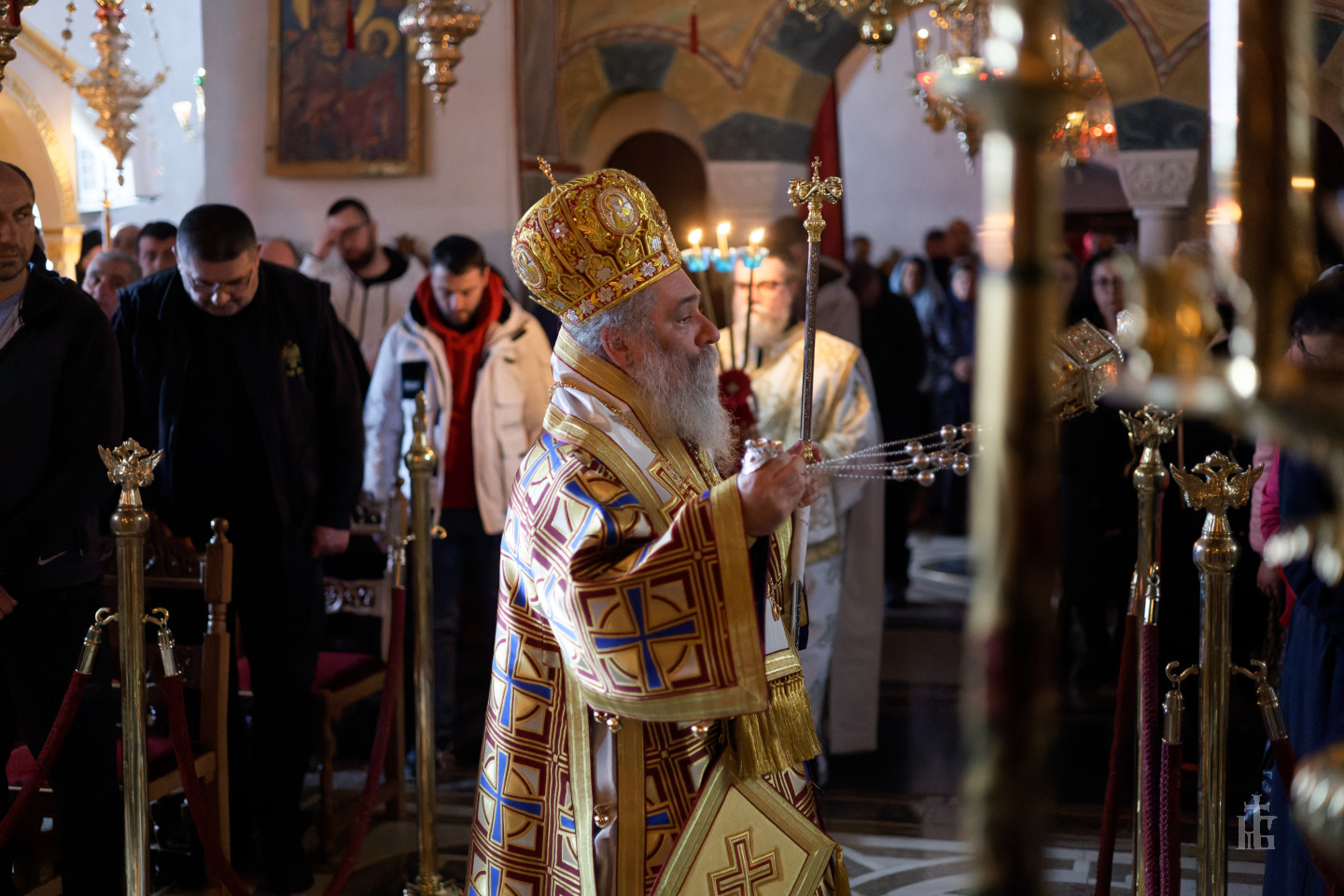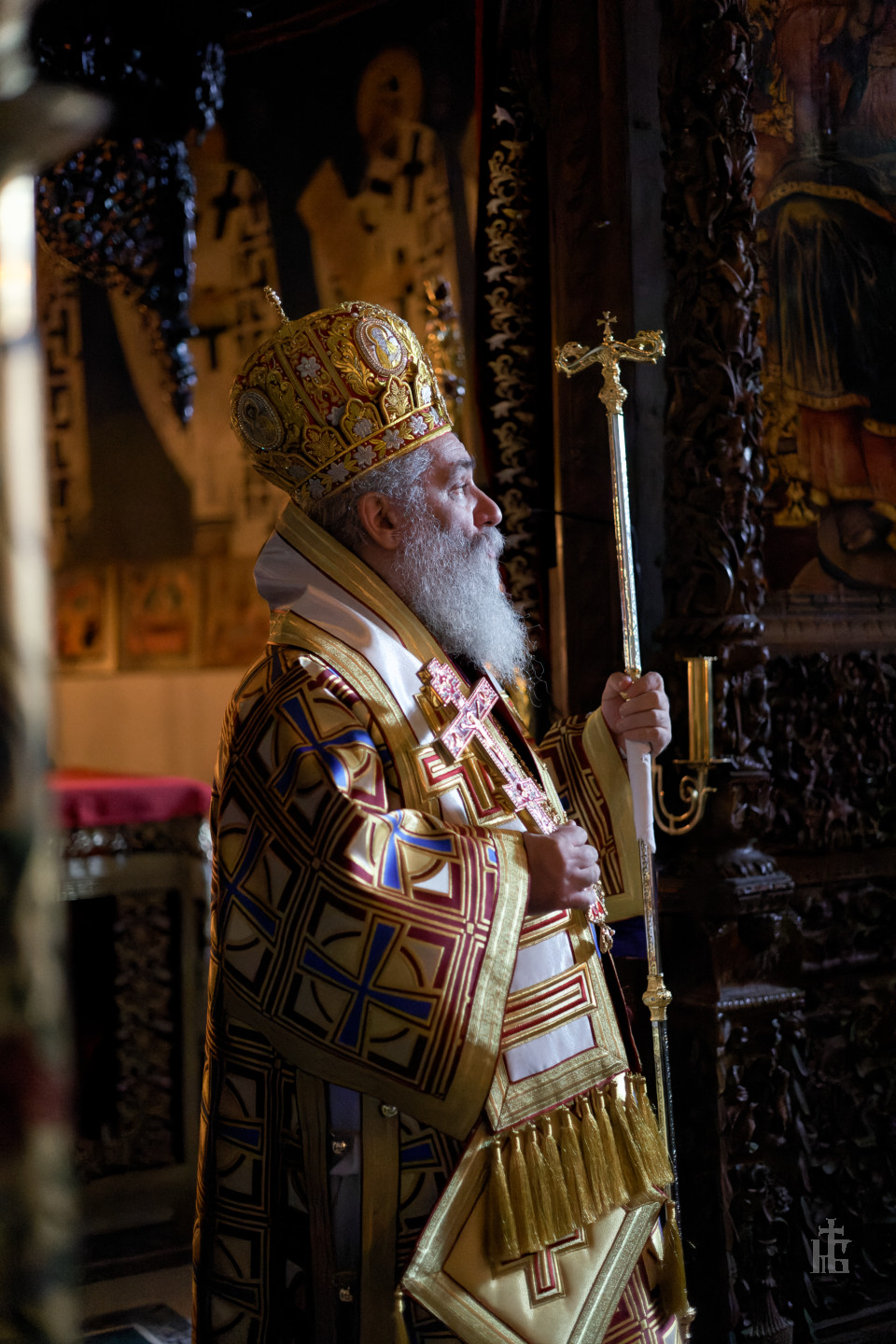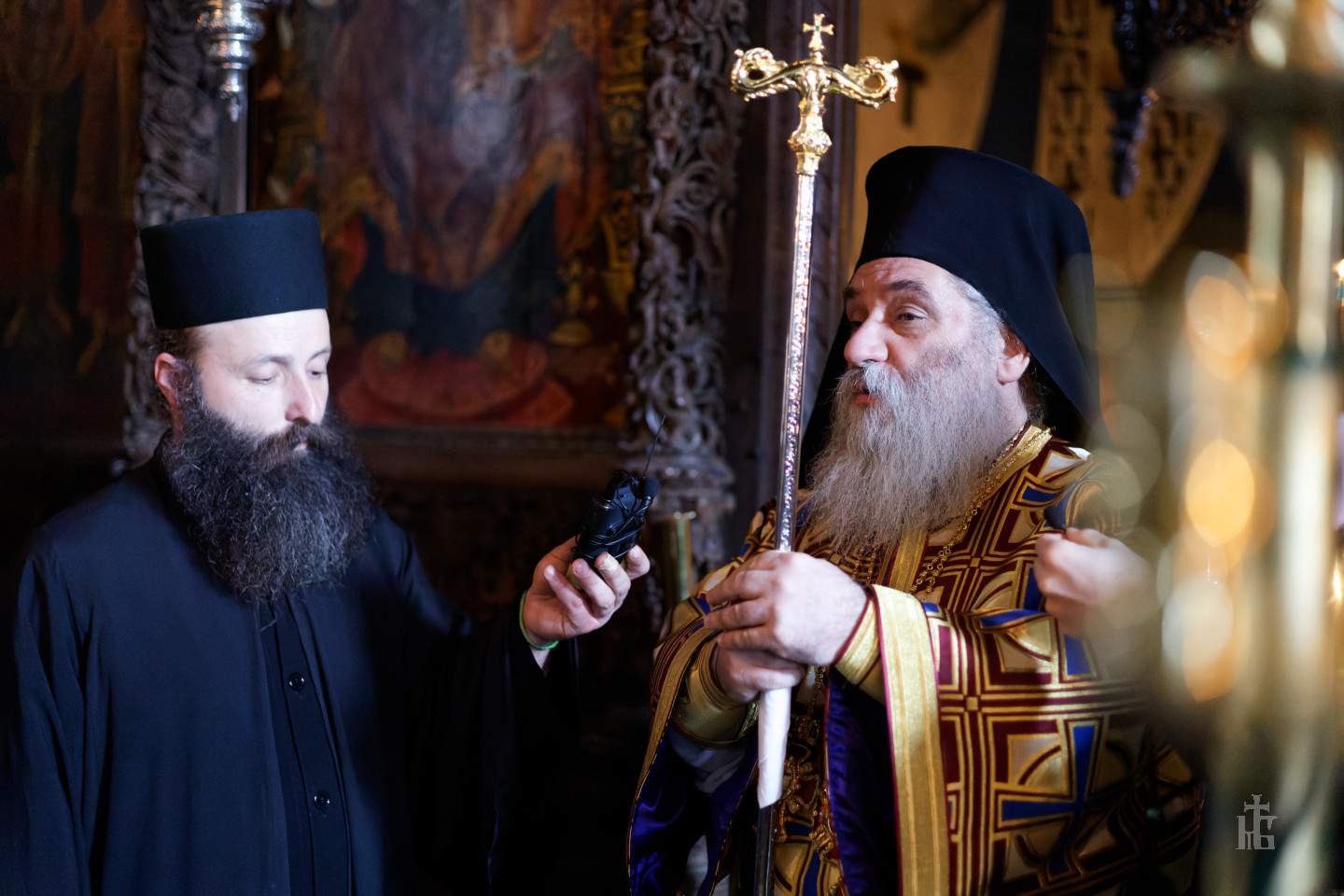Sermon by His Reverence Bishop Parthenius of Antania, Abbot of the Sacred Bigorski Monastery, delivered during the Divine Liturgy on the Sunday of the Publican and the Pharisee, February 25, 2024, in the Year of Our Lord
In the name of the Father, and of the Son, and of the Holy Spirit!
From today, my beloved, we begin to use the divine book of the Triodion, which will be utilized in the services during these preparatory weeks and throughout the entire Great Lent, all the way until Holy and Great Saturday. Our holy Church, thus, from now and over the next ten weeks, will prepare us with its marvellous pedagogy for the greatest feast, which is also the focal point of Christian life – the Resurrection of Christ.
The Triodion – also known as the Three-Ode Book, because the canon at Matins contains three odes with multiple stanzas – starts first with the declaration and chanting of Christ’s parable of the Publican and the Pharisee. Specifically, in this story, the Lord Jesus Christ tells of two men who entered into the Temple of the Lord: Two men went up into the temple to pray; the one a Pharisee, and the other a publican (Luke 18:10). In the Greek original of the text, the Evangelist uses the verb νέβησαν, which literally means ‘they ascended’. The term is used with a dual meaning – practical and spiritual. Namely, to enter the Jerusalem Temple, one indeed had to physically ascend steps, but spiritually, this ascent signifies that when a person sets off towards God’s temple, when they wish to present themselves before God, they must spiritually ascend, i.e., draw closer to God through prayer and contemplation.

One of the two who entered the Temple today was a Pharisee, a man of high status in the then Jewish society, a dignitary and national elder, who knew the Holy Scripture well, fulfilled everything prescribed by the Law, fasted twice a week, and gave tithes to the Temple from all he acquired. In those times, devout Jews indeed fasted twice a week, on Thursday and Monday: on Thursday because the prophet Moses ascended Mount Sinai on that day, and on Monday because he descended and delivered to the people the Law of God he had received from God Himself. In the New Testament, however, we Christians fast on Wednesday and Friday, in remembrance of the betrayal, sufferings, and crucifixion of the Son of God. However, fasting as a practice in itself means nothing if it is not complemented by its essence: humility, good deeds, and prayer. Therefore, the Church today especially reminds us of the fundamental importance of humility in our lives. God prepares us for a meeting with Himself, and as the first step towards this goal, He proposes humility. Indeed, Christ Himself came among us in utmost humility, or, as Apostle Paul says, condescending to us, He humbled Himself to such an extent that He emptied Himself of His divinity, becoming a man, one of us, to be able to commune with us. In theological literature, this divine self-emptying and extreme humility is called kenosis. That is, He came into the world that we humans have turned into a place of suffering, evil, many sorrows, and countless dangers. And we know from His Gospel how many dangers and evils He was exposed to from His very birth, when the wicked King Herod ordered all His contemporaries to be killed, thinking that by doing so, He would be killed too. And how many times did the national elders and leaders try to catch and kill Him, because they considered His teaching to be blasphemy. They simply could not understand God’s humility.
But, my beloved, be assured that we too cannot fully comprehend God’s humility. For truly, the incarnation of the Son and Word of God, His becoming human, His mission on Earth, and His indescribable suffering in the Passion, the Cross and the Resurrection, are a great, holy, and supernatural mystery, incomprehensible to our human logic. We can only accept these divine magnificences by faith, with love and veneration. To be able to somewhat understand, as much as possible for human nature, all that God tells us, what He has done and does for us, we need humility. And precisely the one manifested today by the publican, who, going to the temple, left behind everything surrounding him, looked deeply into himself, recognized his sinfulness and weakness, and asked for only one thing from the Lord: forgiveness. Meanwhile, this man condemned no one, boasted of nothing, did not dare even to raise his head upwards and look towards heaven, because he considered himself utterly unworthy. He stood somewhere at the very back of the temple, with his gaze lowered and with a soulful cry begged for forgiveness and mercy. The other, however, the Pharisee, being a respected and honoured person in society, did not think he needed to go to the temple to pray and connect with God, but to show how much he knew and how observant he was, to boast that he did everything God commanded, fasted according to the provisions of the Law, and regularly gave a tenth to the Temple. Moreover, imagine, he even thanked God that he was not like other men: extortioners, unjust, adulterers, or even like this present publican. He dared so much that in his “gratitude” to God, he condemned all others, even the penitent who had come to pray to God sincerely. He positioned himself so arrogantly as if he knew even the hearts of men. However, my beloved, God alone knows the hearts of men. Only He knows the insides of those we think are liars, thieves, harlots, sinners. And only He knows how much they repent. Some may commit a great sin before our eyes, but we do not know if and how much they will repent, maybe even that same evening. This tells us that we must not be judges of our neighbors. There is only one Judge, the heart-knowing God. For this, Saint John Climacus says: “I know a man who sinned openly but repented in secret. I condemned him as licentious but God saw him as pure, for he had appeased Him with his repentance.”

This is exactly how today’s parable ends. The Lord justified not the haughty Pharisee, but the humble publican. He who humbles himself, who beat his breast and cried out God, be merciful to me a sinner! (Luke 18:13) About him, Christ said: I tell you, this man went down to his house justified rather than the other: for every one that exalteth himself shall be abased; and he that humbleth himself shall be exalted (Luke 18:14).
My beloved, our dear Savior calls us to humility. He taught us humility by His personal example. And numerous saints teach us humility. For, only a humble person can conquer himself. And to conquer oneself is the greatest achieved triumph. This was noted by ancient philosophers before Christ. The humble person can gradually calm and redirect his passions towards something good and thus draw closer to God. He considers himself sinful and the last of all; he knows that everything he has in this life is given as a gift from God and that only He is the owner and healer of both soul and body. Consequently, it is ours to seek God, to pray to Him, to forgive everyone, and under no circumstance to judge as today’s Pharisee did. We go to Church not to condemn and boast but to humble ourselves before the face of God. And for that humble effort, for that little humility, we receive disproportionately more, we receive justification like the publican and acquire the limitless mercy of God.
Some interpreters of the Holy Scripture speculate that the publican from today’s parable might be the same one from the previous week, namely the tax collector Zacchaeus. You may remember from last week the humble Zacchaeus, who showed such a strong desire to see God and to change. Undoubtedly, Zacchaeus certainly spent a long time repenting for his previous sins, struggling, and praying to change, going to the temple, taking the last place there, and praying: “Lord, cleanse me, a sinner.” Only a humble heart, my beloved, can become a dwelling place for God, a house of God, a heavenly gate. The humble person possesses the virtue of looking deeply and impartially into himself and noticing how many weaknesses and passions he has. And when he realizes his own insignificance and powerlessness, the only thing left for him is to seek God, so that he begins to say the prayer of the publican. This penitential exclamation, in fact, became a foundational prayer for generations and generations of monks and hesychasts, and for Christians in general. It attained its final form: “Lord Jesus Christ, Son of God, have mercy on me, a sinner” and with it, countless Christians have been sanctified. Therefore, it is good to say it from morning till evening, throughout the day, and as St. John Chrysostom says, if possible, even throughout the night. This is the prayer of Christian humility, also called the Jesus Prayer, because it takes place in the mind and in the heart, in humility and gratitude.
Now, as the preparatory time for Holy Pascha begins, it is most important, my beloved, to strive in humility and prayer. Not to be carried-away flatterers and self-convinced righteous and know-it-alls. The Pharisee publicly boasted of his virtues and prayers. The Lord Christ at one point in the Gospel describes how the Pharisees and Sadducees went to crossroads to be seen by people, sought first places at feasts, wore clothes with wide hems on which even quotes from the prophets were written, and when they gave alms to someone, they did it publicly, for all to see and praise them. Today, perhaps, self-righteous believers do not go out to crossroads to boast, but they have social networks instead. Thus, it is very frequent to see how Christians, filled with a judgmental spirit, write and write on social networks, confidently argue, distribute justice, and even go so far as to think they are summoned to “defend” Orthodoxy, often even from the priests themselves. We have people on the internet who have read something, watched a few videos on YouTube, and think they know everything. And immediately they position themselves above the priests, the monks, the bishops. Without even having that basic, satisfactory education in the fields of theology and ecclesiology, they take it upon themselves to comment, to judge, to stand in the place of the Lord. But let’s say they are educated. Does that give them the right to publicly condemn? And then cause as many scandals as they want. And they beat their chests: “We are Christians! Orthodoxy to death!” Just like this Pharisee from today’s gospel narrative. And they dare to condemn even the monks. They say: Monks know nothing. In fact, according to their logic, monks, generally speaking, have wasted their lives, vainly given everything they have to God. Because a monk in a coenobitic monastery gives everything he has in life. That does not mean that we, the monks, are saints, that we do not sin, that we cannot fall. But the sacrifice a monk makes when he goes to live and struggle in a coenobitic monastery is great. He cannot even think of, let alone hope to receive a salary, because such a thing does not exist. Nor can he expect to have anything of his own or to be able to leave the monastery whenever he wishes. So, as I said, a monk in a coenobitic setting gives everything he has in life, he gives the most precious thing – his very life. I am not saying this just to praise the monks, but I would like somehow to send a message to those who behave like Pharisees. You see the Lord showed us that this is not the right thing and guided us towards the real thing – to be humble. Indeed, in the liturgical book Triodion we started today, in the service of Holy Thursday, there is a chant describing the event before the crucifixion of our Saviour Christ. Namely, He girded Himself with a towel, then bent down and washed the feet of His disciples, telling them: Ye call me Master and Lord: and ye say well; for so I am. If I then, your Lord and Master, have washed your feet; ye also ought to wash one another’s feet. For I have given you an example, that ye should do as I have done to you (John 13:13-15).

Therefore, humble yourselves before the other, love one another, and judge no one, for only God is a judge, God knows the hearts of men. From the time of the Old Testament, God demands from people to leave judgment to Him: Vengeance is mine; I will repay, saith the Lord. And again: The Lord shall judge his people. And in the New Testament, the Lord commands us: Judge not, that ye be not judged. For with what judgment ye judge, ye shall be judged: and with what measure ye mete, it shall be measured to you again (Matthew 7:1-2). He knew the harshness of human hearts and left us to our own judgment. Therefore, let us be careful! God warned us that if we are harsh with the people around us, with our neighbors, He Himself will be strict with us at the Judgment. And then, He threatened us with our own harsh-heartedness. But despite God’s righteousness, in the end, His mercy and indescribable gentleness prevail again and again, forgiving us and giving us many chances to become true Christians. Therefore, let us strive during this upcoming fast to emulate the humble publican, who took the last place, wept over his misery, over his sins, and sought forgiveness from God. Thus, we may spend the entire fast in a godly manner, not judging our neighbors, loving and doing good deeds. Because fasting, if it is not accompanied by virtues, is just a diet and means nothing before the face of the Lord. May God give us the strength to look into ourselves and strive, to humble ourselves, and humbly to welcome this year’s Holy Pascha, with peace in our souls and peace in the whole world.
Amen!















